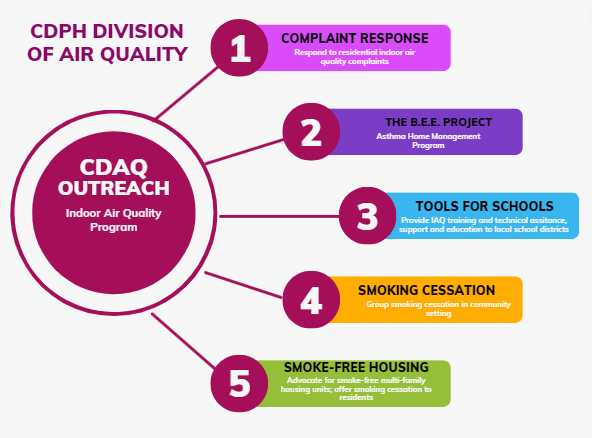Indoor Air Quality: A Crucial Aspect of Public Health
Indoor Air Quality (IAQ) plays a pivotal role in determining the health and comfort of building occupants. According to the U.S. Environmental Protection Agency, Americans spend approximately 90% of their time indoors where the air pollution can be measured at 2-5 times higher than outdoor air. Recognizing the significance of this issue, the Division of Air Quality established the Indoor Air Quality Program in 2018. Dedicated to ensuring healthier indoor environments for all, our program encompasses various initiatives aimed at improving awareness and addressing IAQ concerns in schools, homes, and the wider community.
Who We are: Indoor Air Quality program staff members are trained as Certified Residential Indoor Environmentalists (CRIE) by Indoor Sciences and certified by the American Council for Accredited Certification (ACAC).
What We Do:
Resources:

Cleveland Department of Public Health - Division of Air Quality
Indoor Air Quality (IAQ) plays a pivotal role in determining the health and comfort of building occupants. According to the U.S. Environmental Protection Agency, Americans spend approximately 90% of their time indoors where the air pollution can be measured at 2-5 times higher than outdoor air. Recognizing the significance of this issue, the Division of Air Quality established the Indoor Air Quality Program in 2018. Dedicated to ensuring healthier indoor environments for all, our program encompasses various initiatives aimed at improving awareness and addressing IAQ concerns in schools, homes, and the wider community.
Who We are: Indoor Air Quality program staff members are trained as Certified Residential Indoor Environmentalists (CRIE) by Indoor Sciences and certified by the American Council for Accredited Certification (ACAC).
What We Do:
- Residential Indoor Environmental Assessments: We evaluate indoor air quality, and provide written assessment plan that offers best practice solutions to identify and remove the source of indoor air quality.
- Education and Empowerment: Providing essential health-related resources to residents ensures informed decision-making.
- Community Engagement: We actively engage with the community through outreach efforts, presentations, tabling, webinars, and seminars.
- Public Inquiries: Addressing public concerns and inquiries regarding indoor air quality is a top priority.
- Support: Collaborating with various programs and services within the City of Cleveland and beyond to help residents resolve issues related to poor IAQ.
- Stakeholder Collaboration: Engaging with stakeholders (local, state, or national organizations; block clubs; City council; district representatives; non-government organizations; building scientists; indoor air quality professionals to advocate for better IAQ practices.
- Breathe Easy Everyday (B.E.E. Project): The B.E.E. Project is a comprehensive asthma home management initiative aimed at helping children and families effectively manage asthma. We focus on addressing common environmental triggers found in the home, providing essential asthma education, and ensuring continuous, seamless care outside of clinical settings. Through the B.E.E. Project, we equip families with the tools, resources, and support needed to create a healthier home environment, reduce asthma-related risks, and breathe easier every day.
Click here for more information. - Air Sensor Loan Programs: Residents desiring indoor air quality may borrow tools from the Region 5 U.S. Environmental Protection Agency. Residents are responsible for utilizing the tools provided to receive baseline information on residential/commercial indoor air quality in their home or business.
- Complaint Response: Investigating complaints and helping residents achieve resolutions.
- Smoke-Free Housing Initiative: Collaborating with Cleveland landlords, property managers, and tenants to establish smoke-free housing environments. This initiative aims to mitigate the harmful effects of smoking and secondhand smoke within both single-family homes and multi-unit complexes, promoting healthier living spaces for all residents.
- Tobacco Cessation Services: Offering support for tobacco cessation to promote smoke-free living and working indoor environments. Service provided free of charge.
- Educational Initiatives for Schools: Partnering with schools to educate all occupants on basic indoor air quality improvement practices; reduce occurrences of asthma related symptoms due to poor IAQ; and promote the principles of integrated pest management.
- Public Health Education on Indoor Air Quality (IAQ) Impacts: Enhancing awareness among residents regarding the health consequences of poor indoor air quality (IAQ) is crucial in encouraging informed decision-making. This, in turn, can lead to improved indoor environments and overall well-being.
For further information, watch the TV20 Cleveland segment on Healthy Cleveland and the CDPH Indoor Air Quality Month from October 12, 2023:
Watch the video here. https://youtube.com/watch?v=DiVbRoNsNyI&feature=shared - Residential Air Quality Improvement: Targeted interventions to enhance indoor air quality in residential settings.
- Promotion of Healthy Home Principles: Advocating for and helping residents implement healthy home principles to improve health outcomes.
Resources:
- Air Sensor Loan Programs
- Advancing Healthy Housing-A Strategy for Action
- American Lung Association
- Asthma Resources
- CDC - Asthma Triggers
- CDC
- Cleveland Department of Public Health - Tobacco Cessation Service
- EPA - Links Between Air Pollution and Childhood Asthma
- Multi-Unit Home Dwellers Battling Secondhand Smoke
- National Heart, Lung, and Blood Institute
- Ohio Department of Health Asthma Pocket Guide
- Ohio Department of Health
- Seven Principles of Healthy Homes-Department of Health
- Phone: (216) 664-7454
- E-Mail: Oonwuka@clevelandohio.gov
